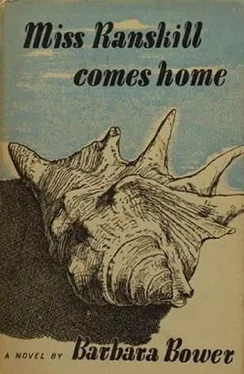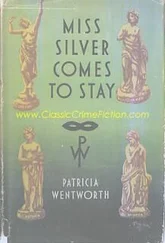‘I feel so ashamed.’
Miss Ranskill looked appealingly at the President.
‘Not at all. Why, I could tell you of one quite well-known broadcaster who always breaks down if he has to speak in a public meeting.’
But she wasn’t a broadcaster.
So she had broken down, had she? She had hoped the speech had not been quite so bad as that. She had thought a lot about the island, but evidently she had not expressed the thoughts even coherently.
‘A good night’s rest and then a good day’s gardening,’ recommended Mrs Phillips savagely, ‘I’ve always heard that work is the best cure for nerves, so I suppose that’s why I’ve never suffered from them.’
‘You had better come home now, my dear,’ said Edith gently, much, much too gently. The tenderness in her sister’s voice made Miss Ranskill afraid.
‘Thank you so much for coming,’ said the President. ‘We shall look forward to a talk from you another day when you are feeling stronger.’
Kind little Miss King (too, too kind Miss King) came forward and spoke in a chirruping voice.
‘I was enjoying the talk immensely. I only wish it had been longer . The island sounded most interesting. Now don’t forget – two aspirin and a glass of very hot milk.’
CHAPTER SEVENTEEN

I
Summer in England had softened to harvest time. The downs were a shimmer of gold and blue. Men and boys, women and children laboured in the blazing sunshine to harvest the best crops of any war and Miss Ranskill, recovered now, worked with them; her ankles ragged by stubble and her forearms sore from the rubbing of stooks. Summer, a most glorious summer, was passing and she, like all the other women in the village, had scarcely had time to notice it. In some couple of dozen cottages middle-aged ladies, without domestic help, had somehow or other done all their own housework as well as keeping their gardens gay and profitable. The deck-chairs in summer-houses were bound by cobwebs, for there was no time to sit in them. It had become a sin to idle, and the fear of that sin was rife in the land. Yet never before, in all the long histories of villages, had houses been better kept, furniture more beautifully polished or cooking more exquisitely done.
If a word in common could have been inscribed on every female heart in the village it would have been ‘bottling’. The spinsters became savage in their quest for bottles and jars, snap-closures and every variety of airtight cover. Never were women so determined and indomitable, in their lust to avoid waste, and in their haste to fill store-cupboards. They had an uphill fight too. At the time when sugar was scarcest because stewed fruit was eaten at every meal, a glut of plums followed a glut of soft fruits. No sooner were two-pound jars collected than two-pound snap-closures went off the market.
‘But, Edith,’ protested Miss Ranskill, ‘in peace-time we never had so much bottled fruit.’
‘In peace-time we could buy all the tinned fruit we wanted.’
‘But we scarcely ever did buy any.’
‘There was suet in peace-time.’ The remark seemed irrational to Miss Ranskill, who had been a desert island housewife, unaware of war or peace, and without suet or bottled fruit. She felt disloyal in her conviction that the old way of eating apples till apples came again (or very nearly) was quite as healthy and a great deal less complicated than this new turmoil.
However, the Ministry of Food fed the prevailing passion by printing instructions for bottling in every newspaper nearly every day. The bookshops and bookstalls pandered too. Nearly all the literature on the bookstalls was devoted to new ways of growing food; and the other half to ways of cooking and preserving it.
‘I must,’ said Edith, ‘I must save two pounds of sugar somehow from now until the rose-hips are ripe.’
‘Whatever for?’
‘Rose-hip syrup, of course, for the children.’
‘Whose children?’
‘My dear Nona, don’t be ridiculous, all the children, of course. Now that they can’t get oranges they must have rose – hip syrup and black-currant juice to make up for the vitamins they don’t get in orange juice.’
‘But I thought they did get orange juice through the children’s ration books.’
For by now Miss Ranskill understood all about ration books and points and the ‘zoning of certain commodities’ as well as clothing coupons; and she thought that a most unnecessary fuss was made about the whole lot.
‘They don’t get nearly enough . It’s most important that we should do all we can for the children. They are the future generation; they are a sacred trust .’
‘We didn’t even have orange juice and we grew up all right. Don’t you remember Mother wouldn’t let us eat oranges within two hours of drinking milk because she said the juice would curdle it?’
Edith Ranskill sighed.
‘Really, Nona, you are difficult . I suppose things were different then. Times change . Anyway, we’re told to collect rose-hips, and it is so important that the children should have the best of everything.’
Miss Ranskill, aware that she was being difficult and now being so deliberately, hurled another dart.
‘You did tell me you’d tried not to have evacuees. And when you had to have them, you got rid of them as soon as possible.’
‘They were different: they were absolute savages – not even house – trained.’
‘The future generation all the same,’ quoted Miss Ranskill as she pushed another plum into her nearly-full jar, ‘and a sacred trust, Edith.’
Her sister shook herself, remarked that she must collect sticks for the boiler because it was bath-night and strode out of ear-shot.
Baths were another great mystery to Miss Ranskill. The boiler was lit only two or three times a week and a broad red line had been enamelled at a height of five inches all round the inside of the bath. It had been indicated to Miss Ranskill by Mrs Phillips that in the interest of national economy she must not fill the bath above that level and she had replied loyally that if it would be any help to the country she would give up baths altogether.
Mrs Phillips had replied disapprovingly that two were allowed each week.
One morning at breakfast she announced archly that someone, she wouldn’t say who, but certainly someone had taken a bath at least ten inches deep.
‘I did,’ said Miss Ranskill, ‘I had the last bath and there was lots of hot water that would have been cold by the morning, so I didn’t see the point of not using it.’
The remark was not received pleasantly by Mrs Phillips.
‘Nona’s so difficult,’ was becoming Edith’s favourite remark. ‘If only that man on the island had been someone of her own class , things might have been very different . As it is , she doesn’t seem to fit in any where.’
Certainly, Miss Ranskill was finding life in the village difficult. Her only pleasure (a strange one) was the fact that she had been made an ARP Warden and was occasionally summoned to patrol her ‘beat’ by night. Others might grumble, but she was perfectly happy and bore the discomfort of the tin helmet for the sake of free feet. No orders had been issued about shoes, so, though she wore the official blue overcoat and respirator, she carried her shoes and stuffed her stockings into her pockets.
The 1943 moons matched that year’s harvest in their generosity, and, on one memorable night, she saw sunflowers, golden as at noonday, against the wall of a cottage and below them a row of tobacco plants, silver as the moon itself.
Читать дальше













